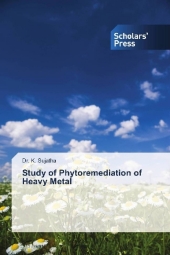 Neuerscheinungen 2018Stand: 2020-02-01 |
Schnellsuche
ISBN/Stichwort/Autor
|
Herderstraße 10
10625 Berlin
Tel.: 030 315 714 16
Fax 030 315 714 14
info@buchspektrum.de |

K. Sujatha
Study of Phytoremediation of Heavy Metal
2018. 164 S. 220 mm
Verlag/Jahr: SCHOLAR´S PRESS 2018
ISBN: 6-202-31628-4 (6202316284)
Neue ISBN: 978-6-202-31628-6 (9786202316286)
Preis und Lieferzeit: Bitte klicken
The chemical composition of sea water and freshwater influences to a great extent the speciation of heavy metals. In river water (which mostly is turbid) large proportion of metals is bound to organic and inorganic particulate matter. Other factors which influence speciation are: pH, hardness, and dissolved organic matter (Salomon´s and Forstner, 1984). Large amounts of dissolved organic complexes and particulate matter with heavy metals are transported great distances to end up in the sediments of the estuaries. Some metals, such as Cd, can be released from their organic complexes by increasing Cl (chlorine) concentrations, which form chloride complexes (Elbay-Poulichet et al. 1987). Metal in the aquatic environment are bioaccumulated by organisms either passively from water or by facilitated uptake. Essential metals are maintained by binding to organic molecules at a variety of biochemical sites where they function mainly as catalysts to induce or enhance enzymatic activity (Regan, 1993). Essential metals at high concentrations can have sub lethal toxicity effects to some organisms or lethal consequences to others. Also, metals at deficient concentrations can have again.
Sujatha, Dr. K.
Dr.K.Sujatha MSc.PhD. Working Lecturer in Botany. She has published articles in reputed international journals and presented research papers in national and international conferences. She is interested in teaching and research.


